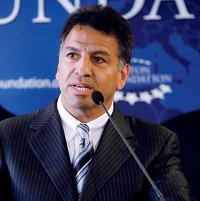Advertisement
Grab your lab coat. Let's get started
Welcome!
Welcome!
Create an account below to get 6 C&EN articles per month, receive newsletters and more - all free.
It seems this is your first time logging in online. Please enter the following information to continue.
As an ACS member you automatically get access to this site. All we need is few more details to create your reading experience.
Not you? Sign in with a different account.
Not you? Sign in with a different account.
ERROR 1
ERROR 1
ERROR 2
ERROR 2
ERROR 2
ERROR 2
ERROR 2
Password and Confirm password must match.
If you have an ACS member number, please enter it here so we can link this account to your membership. (optional)
ERROR 2
ACS values your privacy. By submitting your information, you are gaining access to C&EN and subscribing to our weekly newsletter. We use the information you provide to make your reading experience better, and we will never sell your data to third party members.
Business
Israel's Teva Will Acquire Cephalon
Pharmaceuticals: Generic drug giant to buy top biopharmaceutical firm
by Ann M. Thayer
May 2, 2011
| A version of this story appeared in
Volume 89, Issue 19

Trumping a competing bid, Israel's Teva Pharmaceutical Industries has struck a deal to purchase Frazer, Pa.-based Cephalon for $6.8 billion. The $81.50-per-share offer is a 40% premium over Cephalon's recent stock price. Last month, Cephalon's board rejected a $73.00-per-share hostile bid from Canada's Valeant Pharmaceuticals.
"Cephalon's merger with Teva is the result of a rigorous process that included a review of a wide range of strategic options undertaken by Cephalon's board of directors and management team to maximize value and deliver significant returns to shareholders," Cephalon CEO Kevin Buchi said in a May 2 statement announcing the deal.
Teva and Cephalon have crossed paths before. In late 2005, they settled a patent infringement lawsuit after Teva agreed not to sell a generic version of Cephalon's Provigil in Europe before October 2012. European antitrust authorities are now investigating the deal to see if it unlawfully restricts trade. The U.S. Federal Trade Commission also is pursuing an antitrust case against Cephalon for similar deals with other generic drug makers.
Known for its generic business, Teva is looking to strengthen its branded drug operations. In 2010, generic drugs accounted for about 68% of its $16.1 billion in sales. Cephalon—the sixth largest biopharmaceutical firm with $2.8 billion in 2010 sales—will boost Teva's branded drug sales to about $7.4 billion. Central nervous system products will make up more than 60% of these sales, and Teva will expand into the oncology and pain markets.
"This is transforming for Teva's branded business, as it will help us to deliver on our strategic goal of creating a diversified, multifaceted company," said Teva CEO Shlomo Yanai. Teva isn't shy about large acquisitions. In the past five years it has acquired Ratiopharm for nearly $5 billion, Barr Pharmaceuticals for $9 billion, and Ivax for just over $7 billion.
Teva and Cephalon expect to realize $500 million in cost-saving synergies over the next three years. Work will continue, however, on a combined drug development pipeline of more than 30 late-stage compounds plus three that are awaiting regulatory approval.
"Teva shares our strong commitment to R&D, and we believe our pipeline will thrive under their leadership," Buchi said. In contrast, Valeant said it was interested only in Cephalon's marketed products and made clear it would have disposed of the pipeline assets.
Upon learning of the deal with Teva, Valeant withdrew its offer. Calling the deal positive news for Cephalon stockholders, Valeant CEO J. Michael Pearson said "we are pleased that Teva has paid what we believe is a very full value for the company." Valeant owns more than 1 million Cephalon shares, or slightly more than 1% of the company.



Join the conversation
Contact the reporter
Submit a Letter to the Editor for publication
Engage with us on Twitter